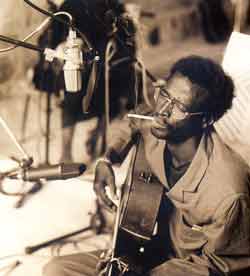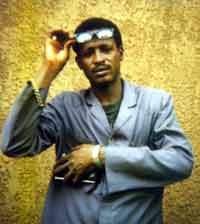| |
|
| Afel
Bocoum |
|
 Messenger
of the Great River
Messenger
of the Great River The Niger is one of the mightiest rivers in Africa, stretching 2500 miles in a great curve that extends east to west from Guinea to Mali, before turning south at the “Great Bend” to flow into the country of Niger. It is on the banks of this “Great Bend” in Mali that a vast network of ancient cities and empires once reigned over West Africa and where today a diverse population of farmers, fishermen, and nomadic cattle herders rely on the river’s resources to survive in the harsh desert climate. By the banks of the river lies the small desert town of Niafunké, home to both the legendary musician Ali Farka Touré and his protégé, Afel Bocoum, who is rapidly becoming one of the most powerful voices of the region. Together with his band Alkibar, meaning “Messenger of the Great River” in the Sonrhai language, Bocoum uses the river as an inspiration and guide, creating a sound steeped in tradition that captures the voice of the people and their relationship to the land.
In
1978, Afel Bocoum finished his studies at a government
agricultural school and began working as an agricultural development
worker. This gave him further opportunity to travel the region and see
first-hand the progress of development in Mali, a country plagued by
a long history of drought, poverty and war that has tested the stamina
of its people. Throughout its history, a special emphasis has been laid
on cultural diversity in the advancement of the nation, and music has
proved a powerful and motivating tool to inspire integration and communication
across ethnic boundaries, helping to create a national identity.
As
an established and respected musician and member of the community, he
strives to combine philosophical commentary on today's society with
an active participation in community activities such as the "Flamme
de la Paix" – the commemorative ceremony that recreates a
pioneer burning of weapons marking the end of the Tuareg
rebellion in 1996. By playing at such events, Bocoum
hopes to influence others to take their future in their own hands. “Africa
has been relying too long on others to solve its problems. It is time
that we listen to each other and create our own solutions.”
He does this eloquently in a style reminiscent of the “desert
blues” sound of Ali Farka Touré,
but In 2002, Afel collaborated with the leader of the band "Blur", Damon Albarn on the hugely popular Mali Music album. The live dates that followed, including an extremely successful show at London’s Barbican, were met with great acclaim. In June 2003 the pair re-united, Damon made a guest appearance with Afel in front of 65.000 people on the main stage at Rosskilde in Denmark. Despite his growing acclaim, Bocoum retains a humble demeanor and gentle nature that modestly redirects the energy of recognition to the importance of the welfare of his people and the inspiration they bring to his music. In
the flowing melodies of the river and the pulsating rhythms of a harsh
desert wind, there is no doubt that the legacy of Ali
Farka Touré is
in the right hands. |
|
MAJ
12/01/2004 |
|
 Bocoum
worked
with Ali Farka Touré and his group
ASCO since the age of 13 for over thirty years,
this time allowed to make a fundamental contribution to the distinctive
sound that helped to put the village of Niafunké on the map and
its music in homes throughout the world.
Bocoum
worked
with Ali Farka Touré and his group
ASCO since the age of 13 for over thirty years,
this time allowed to make a fundamental contribution to the distinctive
sound that helped to put the village of Niafunké on the map and
its music in homes throughout the world.  The
more he immersed himself in his music, the more Bocoum
realized that his skills could be used to greater effect working with
the community as a youth mentor and musical director directly involved
in community activities. “In the countryside in Mali, we don’t
go to the cinema or read the newspapers; but we all listen to music.
Music is the most important mean of getting information across. So I
feel a strong responsibility to speak the truth when I sing because
I know people will heed what I say,” remarks Bocoum.
The
more he immersed himself in his music, the more Bocoum
realized that his skills could be used to greater effect working with
the community as a youth mentor and musical director directly involved
in community activities. “In the countryside in Mali, we don’t
go to the cinema or read the newspapers; but we all listen to music.
Music is the most important mean of getting information across. So I
feel a strong responsibility to speak the truth when I sing because
I know people will heed what I say,” remarks Bocoum. conveys
a stripped down version to reveal the roots of the music. More firmly
focused on the acoustic and traditional sounds of the surrounding cultures,
he uses a one- stringed fiddle (
conveys
a stripped down version to reveal the roots of the music. More firmly
focused on the acoustic and traditional sounds of the surrounding cultures,
he uses a one- stringed fiddle (